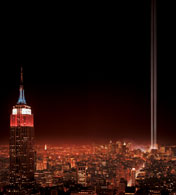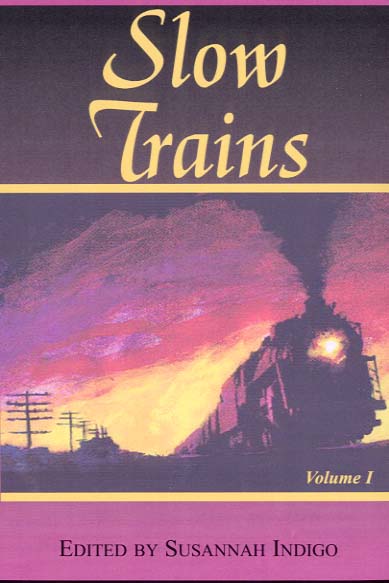
|
Need for gaiety when the first day of the weekend is spent, unexpectedly, in a kind of silent mourning at Ground Zero, & the meager language we muster remains mostly internal, visceral. So the next day get up early to take the Staten Island Ferry, not to get anywhere, because it's free, & Baudelaire praised contemplation of a ship, especially one in motion, as mysterious & infinite. With Ellis Island in the near distance, where my father said they changed our name from Fitzgibbons, we are poor immigrants among all the passengers, looking over our shoulders reminding us again of the disaster down there, where the Towers were, as much from the hole in the sky as the one in the ground. It's difficult to pull oneself up out of mourning into gaiety in one fell swoop. I could have used the dream where my Soul became visible to my daughter only so that I had to look through her eyes on the bus where my Soul was a rectangular piece of glass hovering in the air in the aisle & pressed within it was a rose, Eros. So, of course, we head to Gotham Book Mart on 47th St. where we know we'll find gems like a cheap copy of Apollinaire's erotic writings, & Baudelaire's Intimate Journals. There's nothing like French wit to help bring one up: "She was as red as a beet, her bosom was shaking, but she was at a loss for words." "I am sick of France; chiefly because everyone is like Voltaire." Frank O'Hara joins us, too, when his Selected Poems opens all by itself to "Poem Read at Joan Mitchell's," when we're already on our way to 83rd Street to meet Barney Rosset, the legend, who published Lawrence & Miller & Olson. But not before tramping through the desert of wealth in the Upper Sixties & Seventies making me thirsty, making me wish out loud for a Champagne bar like the one that rescued me from my hangover after the Rauschenberg show at the Whitney, when all of a sudden this little gelatto place on 73rd & Madison turns into none other, (words in fine print,) than a Champagne bar. Ah! Via Quadronno! We share a glass of Gavi de Gavi for $13.50, which does the trick, getting us out of the residential desert into the art world between 83rd & 84th where Janos Gat greets us at his gallery with a glass of red wine telling us Barney & Astrid are in the other room ready to greet us with smiles & handshakes & photographs from the war in the 40's & a story about Joan Mitchell when Barney lived with her in the south of France & recognized it was time, that her work had gotten to a point where they could go home to New York with Pollock & de Kooning, Motherwell & Kline, but responded she couldn't, her oeuvre too large & vast to move. Barney offered to carry it all all by himself on the lone condition she marry him. A few years later, after their formal relationship ended, O'Hara wrote his wonderful poem, ironically one he would have made as long as friendship could last if he could have written a poem that long. Choko came by with her cell phone, effusive ebullience, & exotic look. The young publisher, Scott Korb, as thrilled to meet the legend as I was as thrilled to meet the legend, went out with us afterward for a bottle of Cahors, the "Black Wine of France," where we shared stories of coming to writing, our trip to Cannes, his living in Ireland, the link between intelligence & consciousness, intuition & the unconscious, the reiteration of his mission to publish what is earnest & honest over cynical & ironic reminding me of my distaste for Voltaire. We parted in front of Nicola's on 84th with a firm handshake, a willingness to face the events of today with a language of risk & metamorphosis, & one unforgettable image recalled from that morning of the row of pollarded sycamores on 43rd with branches reaching into the sky transformed into the grieving hands of Grünewald.
©2002 by Robert Gibbons
Robert Gibbons
has work currently online in: The 2River View, The Drunken Boat,
Evergreen Review, Frank
, Gargoyle, Janus Head,
Linnaean Street,
Recursive Angel, and Stirring. A few copies of his limited edition chapbook, This Vanishing Architecture,
are still available from Innerer Klang Press, Charlestown, MA.
Read an interview with Robert Gibbons in The Slow Trains Ten.
|
| Home | Contributors | Past Issues | The Ten | Links | Guidelines | About Us |

|
|
|

